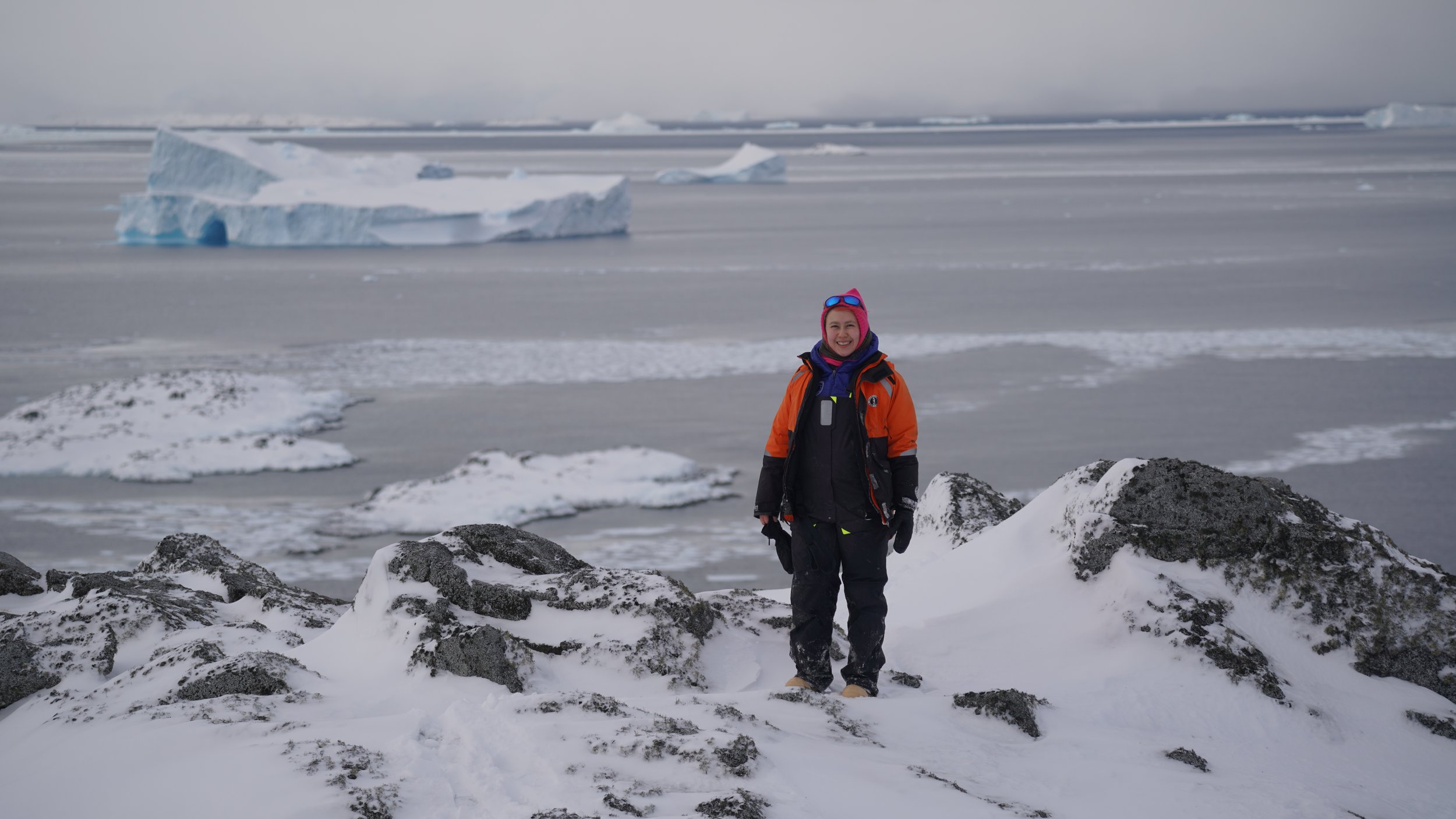I’m Abby Tomita!
My name is Abby! I am from Oregon, and I am currently a student in my fourth year studying Oceanography at Oregon State University. I'm also minoring in Geology. I am particularly interested in marine ecology and biogeochemistry. I plan to graduate in June of this year.
To young readers and scientists, I would say that there is still so much that we can learn from the polar regions, especially as they respond to anthropogenic climate change.
I took an oceanography class in high school and about half-way through that school year, I was certain that I could see my future in it. I had always loved this ocean and my curiosity heightened as I began to learn about complex processes and dynamics that govern the world's oceans. In 2022, I joined Dr. Kim Bernard's Zooplankton Ecology lab hoping to work with zooplankton and getting hands-on lab experience. Dr. Bernard is a professor in the College of Earth, Ocean, and Atmospheric Sciences, and she is an incredibly established polar oceanographer, specializing in the physiology and ecology of Antarctic krill. I worked with Dr. Bernard's PhD student, Rachel Kaplan for several months in the lab, analyzing the caloric density of krill species sampled from the Oregon Coast using a method called bomb calorimetry. This work is part of Rachel's dissertation, which aims to understand predator-prey dynamics between whales and krill over large spatiotemporal scales.
In 2023, I got the amazing opportunity to spend the Austral winter field season at Palmer Station, located on the Western Antarctic Peninsula (WAP) as Dr. Bernard's field assistant and research intern. Dr. Bernard, Rachel, and I spent just under six months in the Antarctic, investigating how Antarctic krill survive the harsh winter, and how their diet during that time affects their development and condition. Survival through the winter is difficult but crucial to the entire Antarctic ecosystem as all larger marine predators feed on them directly or indirectly. At four time points during the season, we performed growth experiments in which roughly 400 individual krill were placed in bottles and checked daily for molts. Krill are crustaceans, so as they grow or shrink, they shed their exoskeletons, and these can be used to monitor their growth rates.
Additionally, we looked at the effects of climate change on the metabolism and energy requirements of sub-adult krill, since the WAP is one of the most rapidly warming regions in the world. Because ocean temperatures are warming, understanding how the metabolism of krill will respond, especially in the winter when food is scarce and metabolic demands are already high.
I never expected that this would be a possibility for me. So, if you have a curiosity about the polar regions, pursue it as far as your heart desires!
During May and June, we sought out and collected krill on board the A.R.V. Laurence M. Gould on two separate research cruises. The first cruise took us south of the Antarctic Circle to Marguerite Bay, and the second took us north into the Gerlache Strait, which was ultimately where we collected our krill for the season. They were brought back to Palmer Station for the duration of the winter. It was such a unique experience being in Antarctica in the winter. From the end of June to mid-October, we were the only three scientists on station and our lovely colleagues working there facilitated all of our science and life in general. This was such a unique and formative experience for me, and I found new meaning in what it means to be a community member.
I feel so lucky to have had this opportunity and experience, but even more than that, I feel lucky to have worked alongside Dr. Bernard and Rachel. They inspire me constantly to be the best scientist and person that I can be. Their support and mentorship have been transformative in my academic and personal life and I'm so grateful for the time we spent together on station.
To young readers and scientists, I would say that there is still so much that we can learn from the polar regions, especially as they respond to anthropogenic climate change. Though the Arctic and Antarctic seem far away, their influence extends across the globe, so it is essential to study and safeguard these regions. I never expected that this would be a possibility for me. So, if you have a curiosity about the polar regions, pursue it as far as your heart desires!
I am half-Japanese and half-White. I'm a fourth generation Japanese-American. I have always enjoyed fiber arts like macrame and crochet, and I've just recently gotten into knitting. So far, I have only made a couple of beanies, but my goal is to make a sweater equipped for Antarctica! I also love movies, TV, and pop culture, and for some reason, those topics just stick in my memory with ease. When I am not in school, I enjoy climbing, biking, and making meals with my friends.
This was such a unique and formative experience for me, and I found new meaning in what it means to be a community member.
The first time I made a personal connection with polar exploration was when I saw the Antarctic Peninsula for the very first time after making it through the Drake Passage. Up until that point, I couldn’t really wrap my head around the reality of my situation because it still seemed so outrageous that this would be my home for the next several months. The water was calm, a nice change from the four days prior in which there was no land to be seen. I remember stepping out onto starboard deck of the ship and seeing a stretch of towering, glacier-capped mountains. I had never seen anything like it, and I felt all my worries about the next few months melt away in that moment as I realized that we had finally made it. After four months of preparation, we were in Antarctic waters. We stood outside for hours entranced by the landscape and wildlife around us.
I hope to continue working in the field and as a sea-going oceanographer.
My family is very proud of me which makes me happy. They were all super excited for me to go on this journey, albeit a bit nervous about the idea of me being in an isolated place an entire hemisphere away. Despite their support, the distance was difficult, especially since I was gone for so long. I’ve lived my whole life in Oregon and the furthest I’ve lived from my parents is about 2 hours, so this was a big change, but it still felt very special to update them on my activities in the lab and around station.
My time in Antarctica has given me a deep appreciation for and connection to the region, so I plan to pursue a career path within polar science or polar science support.
My mentors, Dr. Bernard and Rachel Kaplan inspire me to pursue a career in research. My family also inspires me and gives me unwavering support. The advice I would give to an aspiring oceanographer is to apply to as many jobs and internships as you can. It really helps your odds with getting hands on experience and seeing a variety of work can help you refine your goals and priorities.








